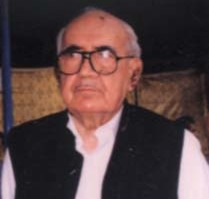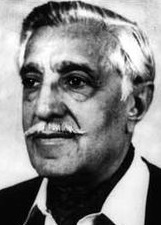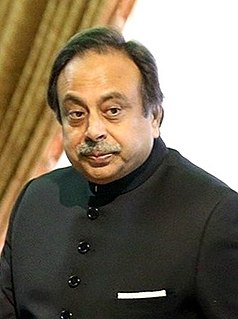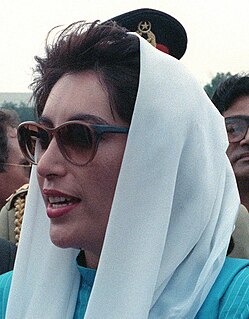The Eighth Amendment to the Constitution of Pakistan allowed the President to unilaterally dissolve the National Assembly and elected governments. The National Assembly of Pakistan amended the Constitution of Pakistan in 1985 and the law stayed on the books until its repeal in 1997.

The Pakistan Muslim League (Nawaz) is a centre-right and liberal conservative political party in Pakistan. Alongside the Pakistan Tehreek-e-Insaf (PTI) and Pakistan Peoples Party (PPP), it is one of the three major political parties of the country. The party was founded by former Prime Minister Nawaz Sharif after the dissolution of Islamic Democratic Alliance in 1993. The party's platform is generally conservative, which involves supporting free markets, deregulation, lower taxes and private ownership. Although the party historically supported social conservatism, in recent years, the party’s political ideology and platform has become more liberal on social and cultural issues.

The president of Pakistan, officially the President of the Islamic Republic of Pakistan, is the ceremonial head of state of Pakistan and the commander-in-chief of the Pakistan Armed Forces.

Ghulam Ishaq Khan, was a Pakistani bureaucrat who served as the seventh president of Pakistan, elected in 1988 until his resignation in 1993. He was the founder of his namesake Ghulam Ishaq Khan Institute.

Farooq Ahmad Khan Leghari(English IPA: fɑrukʰ æɦmæd ləɡhərɪ̈), was a Pakistani politician who served as the eighth president of Pakistan from 14 November 1993 until resigning on 2 December 1997. He is the first Baloch to have been elected as president.

The prime minister of Pakistan is the constitutional head of government of the Islamic Republic of Pakistan, designated as the "Chief Executive of the Islamic Republic".

The Parliament of Pakistan is the federal and supreme legislative body of Pakistan. It is a bicameral federal legislature that consists of the Senate as the upper house and the National Assembly as the lower house. According to the constitution of the Islamic Republic of Pakistan, the President of Pakistan is also a component of the Parliament. The National Assembly is elected for a five-year term on the basis of adult franchise and one-man one-vote. The tenure of a Member of the National Assembly is for the duration of the house, or sooner, in case the Member dies or resigns. The tenure of the National Assembly also comes to an end if dissolved on the advice of the Prime Minister or by the president in his discretion under the Constitution.

The National Security Council is a federal institutional and consultative body chaired by the Prime Minister of Pakistan as its chairman. The NSC is a principal forum that is mandated for considering national security and foreign policy matters with the senior national security advisers and Cabinet ministers. The idea and inception of National Security Council was first conceived in 1969 under the President Yahya Khan, its functions were to advise and assist the president and prime minister on national security and foreign policies.

Sardar Mir Balakh Sher Mazari is the tumandar and the paramount sardar of the Mazari tribe which is situated on the tristate area between Balochistan, Sindh and Punjab provinces of Pakistan.

Shahid Khaqan Abbasi is a Pakistani politician and businessman who served as the 21st prime minister of Pakistan from August 2017 to May 2018. Abbasi is the senior vice president of the Pakistan Muslim League (Nawaz) (PML-N), and secretary-general of Pakistan Democratic Movement (PDM), an anti-establishment coalition of political parties in Pakistan. He has been a Member of the National Assembly of Pakistan since October 2018. Previously, he served as a member of the National Assembly for 8 non—consecutive terms since 1988.
Events in the year 1990 in Pakistan.
Pakistan declared as a country on 14 August 1947
The year 1993 saw political unrest within Pakistan as president Ghulam Ishaq Khan and prime minister Nawaz Sharif duelled for supremacy. Khan dissolved Sharif's government, only for it to be restored by a Supreme Court verdict.

Ashtar Ausaf Ali is a Pakistani lawyer who is the current Attorney-General for Pakistan since May 2022. He previously served in the same capacity from 2016 to 2018. As AG, he co-drafted the Twenty-Fifth Amendment to the Constitution of Pakistan, which merged the Federally Administered Tribal Areas with Khyber Pakhtunkhwa.

General elections were held in Pakistan on 6 October 1993 to elect the members of National Assembly. The elections took place after both the Prime Minister Nawaz Sharif and President Ghulam Ishaq Khan resigned to resolve a power struggle.

General elections were held in Pakistan on 24 October 1990 to elect the members of the National Assembly. The elections were primarily a contest between the People's Democratic Alliance and the conservative nine-party alliance, Islami Jamhoori Ittehad (IJI) headed by Nawaz Sharif.
Ghulam Murtaza Khan Jatoi is a Pakistani politician who served as Minister for Industries and Production, in Abbasi cabinet from August 2017 to May 2018. A former leader of the Pakistan Muslim League (Nawaz), Jatoi served as the Minister for Industries and Production in the third Sharif ministry. and previously held the cabinet portfolios of Minister for Communications during the first Sharif's ministry from 1990 to 1992, and as Minister for Overseas Pakistanis during the Second Bhutto ministry from 1993 to 1994.
The Qureshi caretaker ministry under Moeenuddin Ahmad Qureshi as the caretaker prime minister of Pakistan was sworn into office on 18 August 1993 and only served for three months. Qureshi's tenure as caretaker prime minister is known for the various reforms it brought to the political and bureaucratic setups within the country.

Jam Mir Kamal Khan Alyani is a Pakistani politician who served as the 16th Chief Minister of Balochistan, between August 2018 and October 2021. He has been a member of the Provincial Assembly of Balochistan since August 2018.











